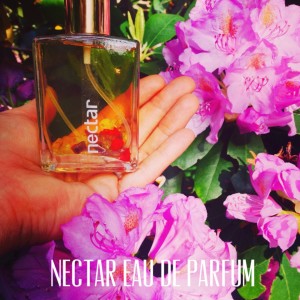I am re-sharing this incredibly important blog by my fellow health crusader Katrina Mayer. I gifted her my Natural Botanical Perfumes and she was inspired to write a blog about this subject and also give my Nectars a shout out!
Is your fragrance making you sick?
A woman sat next to me in my choral rehearsals every week and she wore a lovely perfume. I liked the scent so much that I asked her the name so I could buy a bottle for myself. I went to the store a few days later, purchased it and began wearing my new fragrance every day. I also started getting headaches every day, but I didn’t connect the two until someone at work told me that my new perfume was giving her a headache. Bingo.
Once I stopped wearing the perfume my headaches went away. This was both a relief and also disturbing. I wondered what was in the fragrance that made my co-worker (and me) feel so ill. That’s when I began researching the chemicals that are in some perfumes and other fragrances we use on a daily basis. And, through my research, I also learned that many people share this sensitivity — for very good reason.
Fragrance sensitivity is real. As a matter of fact, the University of Tennessee in Knoxville has published a great brochure on this topic. In the brochure it says that, “Ninety-five percent of the chemicals used in fragrances are petroleum based synthetic compounds.” The brochure then goes on to list the health risks from these chemicals. Here are a few:
1. Fragrance can cause shortness of breath or asthma-like symptoms.
2. Most fragrance chemicals consist of volatile organic compounds, which are respiratory irritants.
3. Inhaling fragrances causes circulatory changes and electrical activity in the brain. These changes can trigger migraine headaches, an inability to concentrate, dizziness, and fatigue.
4. Skin reactions to fragrance chemicals can products rashes, hives, dermatitis or eczema. Other symptoms can include watery eyes, nausea, sore throat, cough and chest tightness.
This brochure on fragrance sensitivity is excellent. To see it, click here.
Now, think of how many products we use that have artificial fragrances added to them. There’s soap, shampoo, conditioner, deodorant, body lotion, hair spray, room fresheners, car fresheners, laundry detergent, fabric softener, carpet deodorizer, dish detergent, window cleaner, and the list goes on. It’s everywhere – absolutely everywhere. But there’s hope and a little consumer awareness can go a long way.
If you suspect you have a fragrance sensitivity, start by looking at the labels on your products. If they list “fragrance” then you are one step closer to finding your culprit. Most fragrance chemicals are not tested for safety so you don’t really know what is in them. And, as we’ve already mentioned, they can lead to quite a few health challenges. The best thing you can do is stop using products with artificial fragrances.
But what do you do then? What products can you use? Here are a few tips and suggestions for how you can avoid using products with toxic artificial fragrances:
1. Make your own products. I know that doesn’t work for everything, but some items are easy and inexpensive to make yourself. Here are the recipes for your own deodorant, laundry detergent, hand soap, and fabric softener for starters.
2. Buy products that have no added fragrance. That isn’t a complete guarantee that there won’t be any other suspect chemicals in the product, but at least you won’t have to deal with the smell.
3. Support companies that create healthy products and use essential oils. My good friend Ami Beach has created a extraordinary line of all-natural perfumes made with pure essential oils. I was hesitant to try them at first because of my sensitivities, but she sent me some samples and they are AMAZING! I am really excited about these nectars. If you would like to see more about Ami’s perfumes, please check them out here NECTARS
So there you have it. A little awareness about fragrance sensitivities can go a long way and maybe even save you from some health challenges.
Sending you love and hugs,
Katrina





